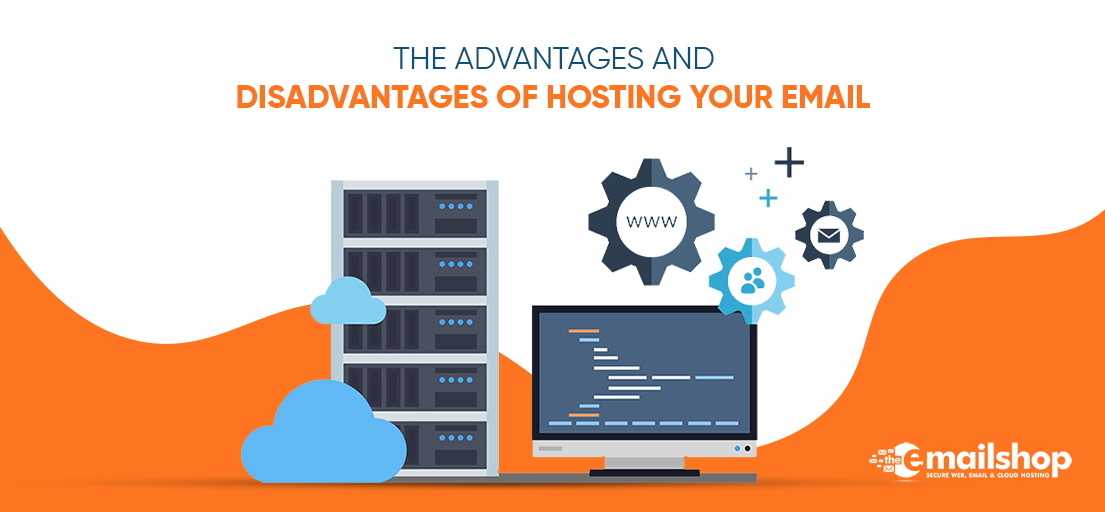Email has become a crucial part of daily communication for both businesses and individuals. It is a quick and efficient way to communicate with others, both inside and externally. However, in today’s digital age, it is vital to consider the advantages and disadvantages of hosting your email. This article will look at the major variables to consider when making a selection and highlight the benefits and drawbacks of email hosting.
Email Hosting Definition
Email hosting is the provision of email services by a specialized hosting provider or server. Unlike free email services, which hold communications on public servers, email hosting is renting or purchasing a dedicated server, especially for managing email communication. This service often offers features like personalized domain email addresses, greater security, and the flexibility to customize settings to match specific corporate or individual requirements. Email hosting gives consumers more control over their email infrastructure, assuring consistent communication and frequently providing additional capabilities beyond basic email capability.
Importance of Choosing the Right Email Hosting
- Choosing the right hosting solution for your email services is a critical decision that significantly impacts your communication infrastructure’s overall efficiency and security.
- Firstly, customization and control over your email environment allow tailoring it to your specific needs, fostering a seamless integration with your business processes.
- Enhanced security measures, another vital aspect, protect sensitive information from potential threats, ensuring the confidentiality and integrity of your communications. The professionalism and branding associated with a well-managed email hosting solution contribute to a positive corporate image.
- However, it’s essential to strike a balance, considering factors like initial setup costs, technical expertise requirements, and potential downtimes. the right hosting solution aligns with your organization’s unique requirements, contributing to a robust and reliable email ecosystem.
Advantages of Hosting Your Email
-
Control and Customization
When you host your email, you have complete control over the email server’s settings and configuration. This level of control enables customization to your organization’s specific demands. You can customize security methods, storage restrictions, and user rights based on your needs.
-
Security Measures
Hosting your email inside allows you to install sophisticated security measures. To protect sensitive data, you can use encryption methods, firewalls, and security software that is updated regularly. This level of security management is critical, particularly for organizations that handle sensitive information.
-
Data Privacy
In-house hosting gives your organization better control over its data. With growing worries about data protection, keeping the email infrastructure on-site decreases the danger of unauthorized access to sensitive information. This can be critical for companies where regulatory compliance is a major concern.
-
Scalability
As your organization grows, scaling your email infrastructure becomes crucial. Hosting your email internally allows for seamless scalability. You can upgrade hardware, allocate additional resources, and adjust configurations to accommodate the increasing email traffic and storage needs without relying on external providers.
-
Cost Management
While there are initial costs associated with setting up and maintaining an in-house email server, it can result in long-term cost benefits. Unlike external hosting providers, who charge monthly fees per user or mailbox, an internal system enables you to better manage costs by controlling hardware upgrades, maintenance, and human costs.
Disadvantages of Hosting Your Email
-
Resource Intensity
Hosting your email infrastructure demands significant resources. This includes time, as IT personnel must invest in setup, maintenance, and troubleshooting. Additionally, there are hardware costs and ongoing investments in technology upgrades.
-
Expertise Required
Managing an in-house email server requires a certain level of technical expertise. IT staff must be knowledgeable about email server configurations, security protocols, and troubleshooting issues. The need for specialized skills can increase the overall cost and complexity of maintaining the email infrastructure.
-
Reliability Challenges
Achieving high levels of uptime and dependability can be difficult without the redundancy and specialized equipment that dedicated email hosting providers provide. In-house systems may be more prone to downtime due to maintenance, updates, or unexpected technical issues.
-
Potential Downtime
In-house email hosting may experience downtime during maintenance periods, software updates, or in the event of technical failures. Unlike external providers with redundant systems and backup solutions, managing downtime can be more challenging and impactful for organizations relying on internal email servers.
-
Limited Features
Some hosted email solutions include advanced features such as integrated collaboration tools, AI-powered analytics, and seamless connection with other productivity apps. In-house hosting may need more functionalities, reducing overall functionality and user experience as compared to external providers.
Read More: Email Marketing Automation: The Ultimate Guide to What, How, and Why
Final Words
The decision to host your email comes with a set of advantages and disadvantages that warrant careful consideration. On the positive side, the ability to customize and control your email environment provides tailored solutions, enhancing integration with business processes. Increased security measures protect critical information while creating a professional image improves corporate branding.
However, issues like initial setup expenses, technical competence required, and the possibility of downtimes should not be neglected. Before making a decision, consider your organization’s budget, IT infrastructure, and growth plans. Striking the correct balance between benefits and drawbacks will result in a hosting solution that works flawlessly with your specific needs, encouraging efficient and secure communication routes.
For Discount and Offers, Visit our Official Twitter Page









